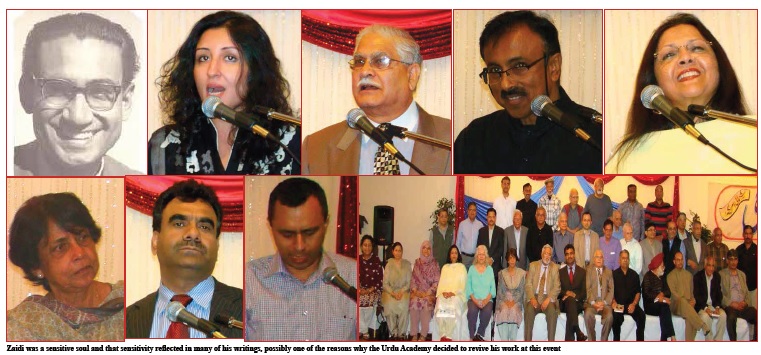Urdu Academy Highlights the Work of Mustafa Zaidi
By Ras H. Siddiqui

The Urdu Academy of North America (San Francisco Bay Area) used its “MEHFIL-E-SHER-O-SUKHAN”eventrecentlyin Newark, Californiato highlight the poetry of the Late Mustafa Zaidi, a man of unbridled passion. Born in the Allahabad area of UP, India in the year 1930 Zaidi died in Karachi, Pakistan in 1970 just days short of his 40 th birthday. The cause of death was ruled a suicide but many still believe that foul play was involved. And if one was to find other reasons for Zaidi’s short but meteoric life, one would be “from too much living” (borrowed here from the late Khalid Hasan who used these words for artist Sadequain). Mustafa Zaidi himself never sought the headlines but they found him and were unforgiving even long after his death.
The Urdu Academy afternoon event was held in two main parts. The first featured the work of a young and very gifted Urdu poet Ghazanfar Hashmi who was himself present at this gathering. Unfortunately we could not attend that segment but heard some of his work later, but the part on Mustafa Zaidi, which was introduced by Tashie Zaheer and rumored to be delayed by him (so many people from a concluding neighboring event could attend). True or not, many of us are indebted to Tashie Bhai for ensuring our inclusion. And that gratitude passes on to Dr Ghazala Ansari too as she so wonderfully detailed the life of Mustafa Zaidi for us including facts that many were either not aware of or had forgotten.
Starting off his poetry writing career in Allahabad in 1949 under his penname Tegh Allahabadi (Sword of Allahabad), Zaidi’s first collection Zanjeerain (Chains) was well received along with Roshni (light). He completed his education at Ewing Christian College and at Allahabad University. He migrated to Pakistan in 1951, dropped his Tegh Allahabadi pseudonym, and Mustafa Zaidi the writer started making his deep impression on the Urdu world. He released five major works in Pakistan; the last one Koh-e-Nida was published in 1971 after his death. Zaidi was also a teacher, a Civil Service officer and an accomplished poet during his short life.
Zaidi’s tormented soul poured into his work through his poetic pen. His life summarized here in two couplets, which he wrote, retain their permanence in many memory banks to this day, thanks in part to Ghazal singer Asif Ali; “Innhi Pattharon Pey Chal Kar Agar Aa Sako Tou Aao, Meray Ghar Key Raastey Mei Koi Kehkashan Nahin Hai” (To reach me you will have to walk (barefoot) over there rocks, there is no starry-galactic pathway to my house (and soul). It is a shame that Mustafa Zaidi’s name was dragged in the mud though the press (especially the evening tabloids) regarding his relationship with socialite Shahnaz Gul. Zaidi was a sensitive soul and that sensitivity reflected in many of his writings, possibly one of the reasons why the Urdu Academy decided to revive his work at this event. Thanks are in order to Arshad Rashid, Khalid Rana, Tahir Mahmood and all the presenters especially Nagesh Avadhany for giving ghazal singer Asif Ali competition while singing Mustafa Zaidi’s work.
In closing, it was good to know that Mustafa Zaidi’s life has been the subject of a PhD thesis from the University of Chicago (2005) titled “"Relocating the Post-Colonial Self: Place, Metaphor, Memory and the Urdu Poetry of Mustafa Zaidi" by Laurel Steele. And Zaidi in his frustration may have prematurely captured words for his own obituary with “Mein Kis Key Haath Pey Apna Lahu Talaash Karoun, Tamam Shehr Ney Pehne Huwein Hain Dastaaney” (On whose hand should I search for my blood? Everyone in this city is wearing gloves!)
